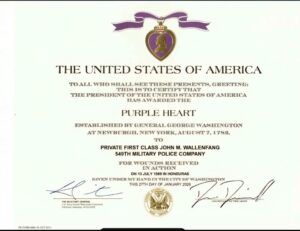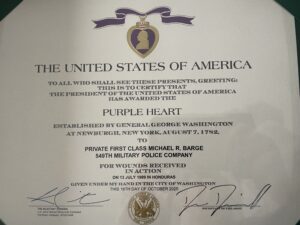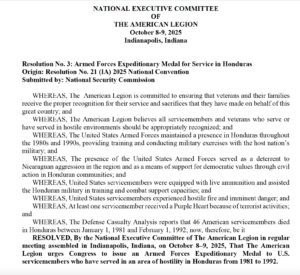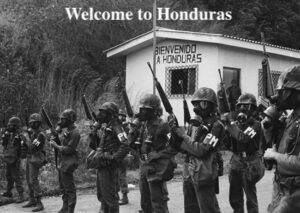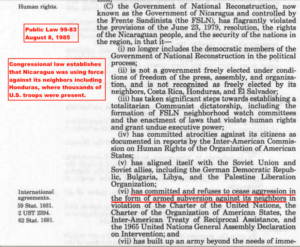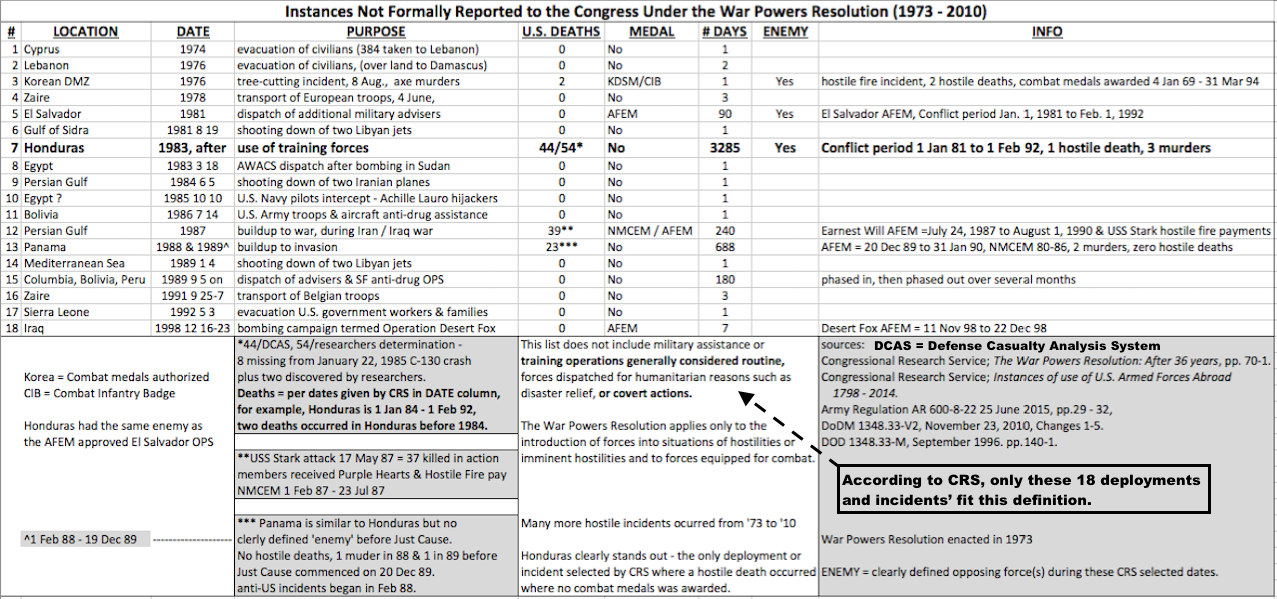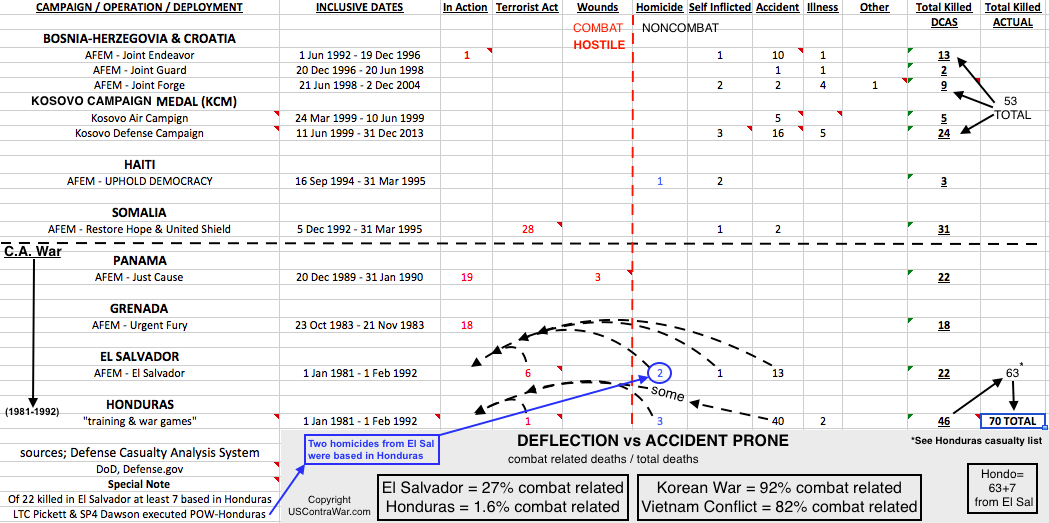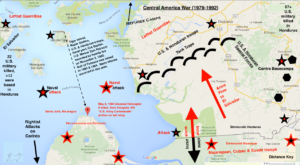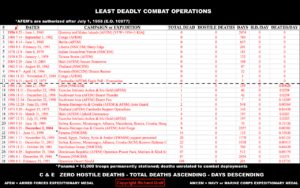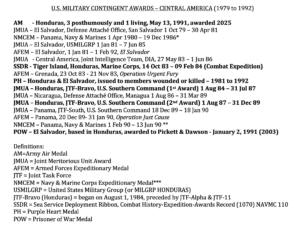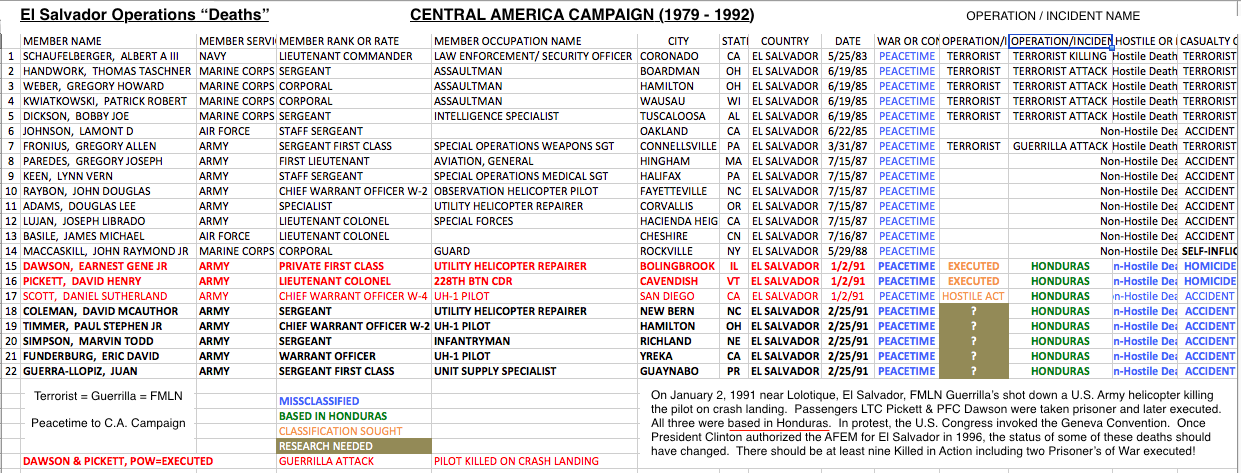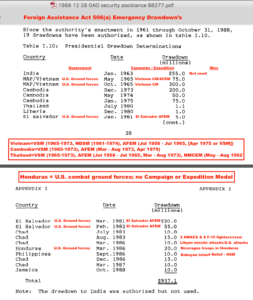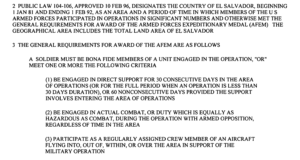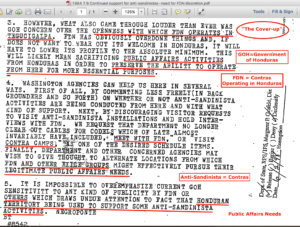-This is a ‘living’ document routinely updated-
The Veterans of Foreign Wars, American Legion, Disabled American Veterans and the State of North Dakota have all adopted Resolutions requesting the U.S. Congress support our cause. Many other veterans’ organizations have also. Several more states (MO, NJ, OH & IA) have introduced and numerous others plan to introduce legislation requesting the same. WILL YOU HELP US?
300,000 deployed, 72 were killed, 48 Purple Hearts, 2 POW & 6 MIA
The Pentagon currently has these deployments listed as ‘Training and War Games.’
——————————————————————————————
CONGRATULATIONS – SPC John Wallenfang was just awarded the Purple Heart during the same attach as SPC Mike Barge below. That makes 48 Purple Hearts during our so-called ‘training & war games.’ John’s public ceremony will be held on April 11, 2026 in Milwaukee, WI. USContraWar has invited Secretary of War Pete Hegseth to attend this honorable event.
CONGRATULATIONS – SPC (Ret) Michael Barge is awarded the Purple Heart, thirty-six years after he was seriously wounded in action in Honduras on July 13, 1989 in La Ceiba, Honduras. Seven Military Policeman from the 549th MP Co. Ft. Davis, Panama were wounded during this attack, four seriously:
Watch the November 7, 2025 ceremony here:
Thank you Army HRC for stepping up and recognizing our Wounded in Action!
October 8, 2025 The American Legion joined our mission – Thank you! (see more below)
This project is dedicated to the families of the six U.S. Service Members Missing In Action, the more than sixty killed in Honduras, the dozens wounded in action, the hundreds of thousands of U.S. military deployed and the people of Central America. As you will learn here, Honduras’ deployments, which are currently designated training missions, were more hostile than twenty-eight combat designated operations.
OUR GOAL – To truthfully and accurately preserve the historical significance of U.S. military activities in Central America that stopped Soviet communist advances ultimately helping end the Cold War, while using this data to properly recognize those who served and their families.
TRAINING & WAR GAMES or COMBAT?
“The (Nicaraguan) Sandinista regime has been waging war against its neighbors since August of 1979. This has included military raids into Honduras and Costa Rica which still continue today (President Ronald Reagan, May 9, 1984, address to the Nation).”
“Nicaragua is waging three wars in Central America. Right now there are guerrilla movements in Nicaragua which are waging war in El Salvador, Guatemala, and Honduras (Rep. Newt Gingrich (R-GA), House floor, June 27, 1985).”
“Nicaragua’s Interior Minister, Tomas Borge Martinez, said recently that ‘a real state of war’ existed along the border with Honduras (Raymond Bonner, NYT GI’s Join Hondurans in Touchy Region, August 5, 1982).”
“Nicaragua has also been equipping, training, organizing, and infiltrating guerrillas and agents into Honduras, it has launched direct attacks into that country using its regular armed forces (Sec. of State George Shultz address before the VFW, March 3, 1986).”
Then Colonel Gustavo Alvarez Martinez (later Honduran Army CINC) said in a national radio address that his country is “tremendously worried” about the arms buildup in Nicaragua and that “Honduras now is confronting an armed aggression from the Soviet Union by way of Cuba. Because of that, if no other possibility exists to preserve peace, Honduras is in agreement that the United States, as a friendly country, intervene militarily in Central America (Indianapolis Star, April 2, 1982 Colonel OK’s US role in Honduras).” General Alvarez Martinez would eventually be assassinated on January 25, 1989 in Tegucigalpa by a Honduran based terrorist organization.
————————————————————————————-
NEW UPDATE JULY 2023 – The VFW has voted to support our mission (see Resolution here and more about half way down this page):
In the words of the VFW – “Americans have lost their lives in some 85 wars and assorted military actions in the past 234 years. Most of the casualties occurred in a dozen or so major wars. But that does not lessen the sacrifice of those killed in the numerous and mostly forgotten minor expeditions in the far-flung corners of the globe. Whenever any American in uniform is killed by hostile enemy action it is meaningful, and that loss must be remembered and forever recognized (VFW Magazine, June 2009 p.21).”
———————————————————————————–
JANUARY – MARCH 2025 UPDATE : The State of North Dakota has now adopted VFW Resolution 419 – Honduras. The House passed N.D. House Concurrent Resolution 3007. On March 11, the Senate PASSED HCR 3007 which was signed by North Dakota Governor Kelly Armstrong on March 27. The state resolution now urges Congress to recognize U.S. troops who served in Honduras from 1981 to 1992 with the Armed Forces Expeditionary Medal or similar recognition. PLEASE! All Honduras and C.A. conflict veterans request your local State Representatives adopt a similar resolution!
Watch the North Dakota Senate vote on March 11, 2025 here
Signing Day March 27, 2025:
Back row left to right: State Rep. Pat Heinert Bill sponsor, State Rep. Jason Dockter Bill sponsor, Robin Daniel Honduras veteran, Richard Grell Honduras veteran and founder of USContraWar.com, Steve Hanson Honduras veteran, State Rep. Todd Porter Bill sponsor.
Front row left to right: ND State Senate Majority Leader David Hogue Honduras veteran, ND Governor Kelly Armstrong, Jody Leingang Honduras veteran.
After a heart warming introduction by Rep. Heinert, Governor Armstrong read the entire resolution to the attendees.
Visit the North Dakota Secretary of State site to download the actual document here.
On October 8, 2025 at the American Legion fall NEC meeting in Indianapolis, IN the legionnaires voted and approved Resolution #3 – Armed Forced Expeditionary Medal for service in Honduras. THANK YOU!
You can download the document here
This massive grassroots movement to change history, which started right here on USContra War in 2015, now has the full support and backing of America’s two largest veterans organizations and the great State of North Dakota. Ohio and New Jersey may be next. Our request is “on the desk” of the Secretary of War and many state legislators and Members of Congress are aware of our movement. Who will be the champion that will carry this across the finish line?
Central America War 1979 – 1992
USContraWar is published as a repository for the estimated 300,000 U.S. military members deployed to Honduras during the Central America War from October 1, 1979 to February 1, 1992, their families and others interested in what U.S. troops were actually doing during the conflict. The war includes the Defense of or continuation of the Nicaraguan Revolution (1979 – 1990) and the correlated Contra War (1979 – 1990), the El Salvadoran civil war (1981 – 1992), the Phase II insurgency in and Nicaraguan attacks on Honduras (1980 – 1992), the Grenada Rescue Urgent Fury (1983), the Panama Invasion Just Cause (1989 – 1990) and significant terrorist attacks, guerrilla / insurgent war activity throughout Central America. U.S. military involvement in Honduras during the conflict began in 1981 and terminated in 1992.
After the twenty year Vietnam War ended in 1975, the American public was not ready for another conflict. The Democrat controlled Congress and President Reagan were at odds in the manner of how, or if, to intervene in the emerging Communist movements taking a foothold in Latin America. Congress placed limits on the Administrations more belligerent behavior towards the Soviet Union’s aggressive advances in Central America within, for example, the two Boland Amendments (1982 & 1984) restricting Reagan’s military buildup. Both sides struggled on how, or if, to fund the various conflicts. For the whole Central American apparatus to function, however, Honduras had to appear safe for U.S. Service Members to ‘train for war games’ so thousands of troops could be deployed into the region to process the actual ongoing conflicts.
We at USContraWar are advocating for conflict recognition in the form of an Armed Forces Expeditionary Medal (AFEM), a Central America Campaign Medal (CACM) and the National Defense Service Medal (NDSM) by the United States Government for service during the decade that ended communist advances into the Western Hemisphere allowing democracy to flourish in Central America. All of this was done to protect the U.S. southern front, according to the Reagan Administration.
These corrections and acknowledgments are necessary so the Service Members and their families will receive the proper respect they earned, which leads to enhanced benefits in the Veterans Administration, psychological healing, Gold Stars, updated service records, closure for the loved ones and to be ‘remembered and forever recognized.’
Our research has concluded that at least:
- forty-six Purple Hearts were awarded to U.S. military members while serving in Honduras; another thirty-two wounded or killed but wrongly not awarded the Purple Heart,
- seventy-two service members were killed in Honduras or were stationed in Honduras,
- one U.S. military member was Killed In Action in Honduras,
- three-hundred terrorist and Nicaraguan military attacks occurred in Honduras,
- one Honduran based insurgent group known as the United Revolutionary Coordinating Board declared war on the U.S,
- a Phase I Insurgency was ongoing in Honduras,
- six Service Members are Missing In Action, and
- two POW Medals were awarded; all during training and games.
With the United States, El Salvador, Guatemala and Honduras facing up against Nicaragua, Cuba and the Soviet Union, the world teetered on the brink of an international conflict from 1979 to the early 1990’s. Learn here just how close we actually came to entering World War III. In March 1986 for example, during an Executive Branch declared National Emergency against Nicaragua, President Reagan authorized $20 million in Foreign Assistance Act 506(a) emergency drawdown military aid to help Honduran military forces repel a Nicaraguan military invasion. During this period, the U.S. was funding a secret army, now known as the Contras, who, from basecamps located in Honduras, conducted countless military raids into Nicaragua. Conversely, Nicaraguan military forces and insurgent guerrilla units from El Salvador and from within Honduras attacked their enemies in Honduras. Fortunately, the decade of the 1980’s ended Soviet Communism and its advances into the Western Hemisphere. View our Chronology of a ‘Phantom War’ page timeline for details.
The following chart shows how many foreign military advisors were in Nicaragua. The Soviets, Cubans and Nicaraguans did not consider this training and war games.
The below declassified document sums up the burden facing U.S. and Honduran officials during the summer of 1983, forcing Reagan to commence with ‘exercise’ Ahuas Tara II so he could introduce thousands of U.S. military personnel into Honduras under the auspices of training avoiding Congressional scrutiny under the newly enacted War Powers Resolution (BACKGROUND PAPER: NICARAGUA’S MILITARY BUILD-UP AND SUPPORT FOR CENTRAL AMERICAN SUBVERSION, Department of State, July 18, 1984, Washington D.C., CIA-RDP88B00831R000100210054-1, page 28, approved For Release 2008/11/07). Also, see the Chronology of a Phantom War page, scroll way down to July 1983 Operation Patuca, for an example:
Now, if you read that and think to yourself, I was there and didn’t know all this was ongoing, or maybe you heard some things, maybe you encountered hostile fire, however, during most war or conflict operations only about 20% of those deployed actually experience combat (Ken Burns Vietnam documentary, GAO study on Korean war). So 40+ Purple Hearts awarded during training is interesting, to say the least!
The U.S.S. Honduras:
Here is a snapshot of activity near Tegucigalpa during the summer of 1987:
Does this look like any training mission you were ever involved in? Name another training mission where dozens of Purple Hearts were awarded. Please help us explain this to the families of the known 72 killed and the known 47 Purple Heart recipients or the 31 additional troopers who should have been awarded the PH! How can two POW medals be awarded to members stationed in Honduras, yet deny combat status to the soldiers who bunked next to them the night before? During a typical military training mission, American soldiers pretend to be the ‘Opposing Force’ or OPFOR and carry blanks with red blank adapters visible on the riffle barrel end, the MILES System or paintballs. In Honduras, hostile foreign nationals with live ammunition played the opposing force.
The below partial two pages come from the declassified U.S. Southern Command Annual report for 1984. These were real world aerial photographic and signal intelligence gathering missions relayed to ongoing U.S. joint combat command missions in EL Salvador, Nicaragua and Honduras. If there is any doubt left that this was a regional conflict worthy of a campaign medal then why were these flights originating from CONUS, Panama and Honduras. C-130 gunships were often brought in from these locations to assist during heightened operations.
Below are more examples of the reality facing U.S. troops deployed to Honduras:
This political poster found in Honduras in the mid-1980’s reads:
“Firm Your Fist Against The Invader, Gringo troops out, Contras out, Coordinating Committee of Popular Organizations”
The below section of Public Law 99-83, August 8, 1985 statutorily acknowledges that Nicaragua “has committed and refuses to cease aggression in the form of armed subversion against its neighbors” including Honduras. Thousands of U.S. military members have been present in Honduras since 1980!
The following chart, created by USContraWar, raises several important questions. For example, why aren’t the Honduran deployments of U.S. military members officially recognized as a foreign campaign and why aren’t these deployments listed in Service Members records? The clearly defined enemy was Nicaragua with Soviet/Cuban support of communist expansionism throughout Latin America, dozens of Purple Hearts were awarded to U.S. Service Members stationed in Honduras, two Honduras based U.S. Service Members received the POW Medal and at least one U.S. service member was killed in action in Honduras; yet the U.S. Government classifies these deployments as training and war games. U.S. troops were deployed to Honduras beginning in 1980 and remained throughout the conflict. Some U.S. troops are still stationed in Honduras today.
The chart further details important U.S. foreign military deployments and instances that were not reported to Congress under the War Powers Resolution or Arms Export Control Act selected by the Congressional Research Service (CRS) from the end of the Vietnam War up to 2010. Honduras is the only deployment or instance where Purple Hearts, POW medals and Hostile Fire Pay were authorized, but no campaign or expeditionary medal was issued. Also, Honduras is the only long-duration deployment selected by CRS.
At USContraWar you will find extensive information regarding military and terrorist attacks against U.S. troops, citizens and assets in Honduras and throughout the Isthmus during the Central America War.
Our main goal at USContraWar is to petition the U.S. Congress and the Executive Branch to issue an AFEM or CACM, the NDSM, and other combat recognitions to U.S. troops who served in Honduras and Central America during the war ultimately leading to the creation and issuance of the Central America Campaign Medal. This is important because we believe it is critical to establish accurate databases of U.S. casualties that occurred and instances where U.S. troops in Honduras and Central America were subjected to hostile fire, explosive devices or conducted offensive operations against the enemy.
The following single document equals the totality of hostile deaths (1 KIA) of the ‘remembered and forever recognized’ Kosovo Campaign Medal and related AFEM Operations of the 1990’s in Albania, Bosnia, Croatia, Macedonia, Herzegovina, Montenegro, Romania, (Kosovo) and Serbia area of operations under President Clinton:
U.S. military members who deployed to Honduras during the C. A. War do not have these deployments or related awards listed in their official military records. Imminent Danger Pay (IDP) was not authorized.
However, the following DoD report clearly establishes imminent danger in Honduras during one of the largest U.S. operations called Ahuas Tara II (Big Pine):
9 Dec 83 Defense Intelligence Agency report; Subj: DIA TERRORISM WARNING REPORT 83-1 FOR US FORCES LOCATED IN HONDURAS 1. DIA ASSESSES AVAILABLE INFORMATION ON TERRORIST CAPABILITIES AND INTENTIONS AGAINST US FORCES LOCATED IN HONDURAS AS SUFFICIENTLY SERIOUS TO WARRANT HEIGHTENED COMMAND ATTENTION AND SECURITY PRECAUTIONS. 2. …AN INCREASING POSSIBILITY OF AN ATTACK AGAINST US MILITARY PERSONNEL IN HONDURAS… 4. …US FORCES IN HONDURAS FACE A HEIGHTENED THREAT…THE HONDURAS LEFT PROBABLY FEELS PRESSURE TO PERFORM SOME “OFFENSIVE ACTION” AGAINST THE US…US FORCES IN HONDURAS SHOULD EXERCISE CAUTION AND MAINTAIN INCREASED SECURITY AWARENESS…
1983 12 9 terrorism threat report for U.S. forces in Honduras CIA-RDP85M00364R001302230014-9
For more information on Purple Hearts awarded for service in Honduras, please visit our Purple Hearts page.
This next chart visually explains what happens when U.S. military combat forces are deployed to a hostile foreign country where Congress has outlawed these deployments.
Compare and contrast similar foreign military operations and you will see that Honduras remains the only foreign deployments classified as training and war games where imminent danger existed, hostilities persisted, and Purple Hearts were issued, yet the U.S. maintains this was all for training and games.
Here is DoD’s position: DOD Response 20 Apr 2018 Office of the Assistant Secretary of Defense; When asked to create a Central America Campaign Medal “the Department of Defense (DoD) cannot support such a request” because “campaign medals recognize deployed participants in large-scale or long-duration combat operations, and are associated with the highest level of personal risk and hardship. U.S. military training exercises conducted in Honduras during the 1980’s and early 1990’s were not qualifying combat operations.”
In 2014, DoD had 54 designated IDP (combat) areas world-wide, many with zero fatalities, few if any wounded and little or no hostile attacks reported in many years, yet everyone deployed received IDP, combat awards and Combat Zone Tax benefits.
Back in Central America in 1985, the United Nations Security Council (UN SC) adopted Resolution 562 condemning U.S. actions towards Nicaragua. The U.S. rejected the eighth paragraph of the preamble and operative paragraphs 1 and 2 of the draft resolution contained in document S/17171, so they were not adopted into the final resolution. This is the only such UN SC Resolution condemning U.S. military action during the final decades of the Cold War.
U.S. troops were deployed to Honduras as a protective shield as confirmed by General Gustavo Alvarez Martinez, Honduran CINC, who stated “We are at war with the communists who have invaded our organizations (UPI, Honduran Army Chief Says U.S. Presence Protects Nation, January 24, 1984).” The title of this article is a quote by General Alvarez who claimed that U.S. troops who were deployed to Honduras were protecting Honduras (and therefore the U.S.) against Soviet/Cuban support of communist Nicaragua and insurgent aggression throughout Central America.
— SPECIFIC FACTORS —
The Executive Branch declared a National Emergency against Nicaraguan on May 1, 1985 which lasted until March 17, 1990. The U.S. also imposed a trade embargo and terminated its Treaty of Friendship, Commerce and Navigation with Nicaragua during this same period. The U.S. took these steps to “deal with the unusual and extraordinary threat created by the aggressive actions of the Government of Nicaragua in Central America…and therefore to the United States (EO 12513 May 1, 1985; U.S. Dept. of State memo subj. Economic Sanctions Against Nicaragua, John D. Blackan, May 8, 1985).” Other related threats existed from 1979 to 1992. Also, DOD began issuing Hostile Fire Pay to U.S. military members serving in El Salvador on October 1, 1979 which should be the starting date of the CA War. The Honduras portion of the CA War remains the only such Presidential National Emergency declaration against a foreign enemy where U.S. forces were dispatched and no Campaign or Expeditionary medal was awarded.
At least seventy U.S. military members were killed in Honduras or were based in Honduras during the war-which is more U.S. casualties then during the Panama Invasion, the Grenada Rescue and El Salvadoran civil war-combined. The Honduras portion of the C.A. War remains the only conflict not recognized by the U.S. Government as a combat zone, therefore no AFEM or NDSM have been issued. Countless additional U.S. troops were wounded, in Honduras, during attacks by terrorists and foreign military forces operating inside Honduras. In comparison, the Bosnia / Kosovo Campaign and related AFEM OPS (1992-2013) have one hostile death, yet all who deployed will be ‘remembered and forever recognized’ through the issuance of group campaign / expedition medals and individual combat awards.
The above chart shows how many U.S. military operations earned combat recognitions with zero hostile deaths; several with zero fatalities total. Most are not large-scale or long-duration as DoD stated as the reason Honduran deployments are being denied! As of 2016, there are eleven combat operations with zero fatalities. In comparison, the Quemoy and Matsu Islands combat expedition from 1956 to 1963 was 2,474 days long with zero fatalities. On the opposite end of the scale, Operation Eagle Pull, in Cambodia in 1975, was three days long with zero fatalities. Both earned combat expedition status and are therefore ‘remembered and forever recognized.’ Another example of a short combat expedition was the five day Congo operation in 1964 with zero deaths. It is blatantly clear that neither duration nor fatalities are factors in determining when to issue combat recognitions. The Honduran deployments are not listed because there is at least one hostile death.
The Qualified Hazardous Duty Area (QHDA) was created to deal with the Balkan’s special situation mentioned above. Bosnia and Herzegovina, Croatia, and Macedonia were designated by Congress in 1995 as a QHDA after concern over U.S. possible involvements in combat. This new combat designation provided the same benefits to SM’s and families as a combat zone (Pleeter, Saul, Institute For Defense Analyses, Risk and Combat Compensation, August 2011, page 24). From 1996 to 2007, there were 20 deaths in the Balkans’ operations with one being hostile. Honduras, from 1981 to 1992 has at least one hostile death and over 60 military fatalities. Both examples are long-duration and arguably large-scale.
CW2 JEFFRY SCHWAB was killed on January 11, 1984 by Nicaraguan government troops after his helicopter was shot down, followed by additional small arms fire when he was fatally struck in the head by a round. The Nicaraguan government claimed they shot his helicopter down over Nicaraguan air space. The U.S. Government claimed they were flying over Honduran air space when they were shot down. Two other U.S. troops escaped, apparently without injuries. Upon rescue attempts of the two survivors, U.S. troops allegedly came under additional hostile fire. This is the only listed Honduran based American military casualty the U.S. government has publicly acknowledged AS RELATED TO THE CONFLICT and the incident is listed as a terrorist act during peace time. Nicaraguan troops were not part of a terrorist organization or group. Jeff Schwab’s Purple Heart reads “FOR WOUNDS RECEIVED IN ACTION IN HONDURAS ON 11 JANUARY 1984 WHICH RESULTED IN DEATH.” Schwab saved the lives of his two passengers and has not been posthumously awarded a combat award for valor. Central Command’s CINC General Paul Gorman’s letter to Schwab’s widow reads in part, “Chief Warrant Officer Jeffrey C. Schwab, whose cool courage under fire, and skilled airmanship saved the lives of his passengers (letter dated 30 January 1984).” All three were paid Hostile Fire Pay (HFP).
Of the twenty-two U.S. military members killed in El Salvador during its AFEM recognized status, as many as twelve were based in Honduras including members of the 228th Aviation Regiment LTC David Pickett, CW4 Daniel Scott and PFC Earnest Dawson (posthumously promoted to Specialist). Their helicopter was shot down on January 2, 1991 by FMLN communist guerrillas near Lolotique, El Salvador on the return leg of a round-trip flight from Soto Cano Air Base, Honduras to San Salvador, El Salvador. CW4 Scott was killed upon impact while piloting the craft. LTC Pickett and PFC Dawson survived the crash, were captured by the enemy and later executed as wounded Prisoners of War. Both were awarded the Purple Heart. LTC Pickett was posthumously awarded the POW medal and SPC Dawson’s family has finally been honored with his POW medal.
These two incidents alone establish that regular military conventional U.S. combat forces, based in Honduras, were conducting combat missions in support of the Central America War. As with the Bosnia / Kosovo low intensity conflict with one hostile death, all U.S. service members who deployed to Honduras should have their service records updated with proper combat recognitions and listed deployments.
Not including the numerous individual awards such as the Purple Heart, Air Medal or POW medal, there is no actual group combat medal issued to U.S. Service Members deployed to Honduras. The JMUA is not a combat medal, but is listed here to establish the importance of these operations. Joint Task Force-11, Headquartered at Palmerola AB, became operational on 13 August 1983, was later renamed JTF-Alpha, but from June to August 1984 was briefly named Task Force-Maya which terminated when JTF-Bravo became operational on 01 August 1984. JTF-Bravo is still active and is DoD’s longest running Joint Task Force. All JTF’s operating at Palmerola (Soto Cano) during the CA War period have been awarded the JMUA.
NEW UPDATE – The Veterans of Foreign Wars (VFW) agrees with the conclusions at USContraWar! In July 2023, during its annual national convention in Phoenix, the VFW voted to adopt Resolution 419 – Honduras. That VFW Resolution was later submitted to Congress for consideration. THANK YOU! See the text of the Resolution here…
[Resolution No. 419. HONDURAS
WHEREAS, the vision of the Veterans of Foreign Wars (VFW) of the United States is to, “Ensure that veterans are respected for their service, always receive their earned entitlements, and are recognized for the sacrifices they and their loved ones have made on behalf of this great country;” and
WHEREAS, the VFW believes all military members and veterans who serve or have served in hostile environments should be appropriately recognized; and
WHEREAS, the United States (U.S.) military maintained a presence in Honduras throughout and beyond the 1980s providing training to and conducting military exercises with the host nation military; and
WHEREAS, the buildup and presence of U.S. troops served as a deterrent to Nicaraguan aggression in the region and also a means of building support for democratic values via civil action in Honduran communities; and
WHEREAS, U.S. troops were equipped with live ammunition and assisted the Honduran military in training and combat support capacities; and
WHEREAS, U.S. troops reported experiencing hostile fire and imminent danger; and
WHEREAS, at least one U.S. service member received a Purple Heart because of terrorist activity; and
WHEREAS, U.S. troops lost their lives while conducting various duties due to terrorist activity and other hazardous circumstances; now, therefore
BE IT RESOLVED, by the Veterans of Foreign Wars of the United States, that we strongly urge Congress to issue an Armed Forces Expeditionary Medal, or similar recognition of having served in an area of hostility, to all U.S. troops who served in Honduras from 1981 to 1992.
Submitted by Commander-in-Chief
To Committee on NATIONAL SECURITY & FOREIGN AFFAIRS by the 124th National Convention of the Veterans of Foreign Wars of the United States.]
*Please support the VFW’s mission by contacting your local Congressional Representatives and request they support VFW Res. 419 Honduras (2023).
The following chart details those who perished in El Salvador during that portion of the CA War. As many as twelve were actually stationed in Honduras, mostly at Palmerola Air Base (later renamed Soto Cano AB) and were dispatched on combat missions to El Salvador. Hence, all military members who were deployed at Palmerola AB and were in direct support of any personnel or unit supporting these missions to El Salvador, where these flights originated, were acting in direct support of El Salvador AFEM combat missions and therefore should have qualified for CZ or QHDA benefits and recognitions as outlined in FMR 7000.14-R (see regulation details further down in this article). This never happened!
During the Central America War, more than 300 U.S. troops were killed in the extended theatre of operation.
Civilian casualty estimates range from 100,000 to as many as 400,00 killed as a direct result of the Central America War.
Over 300 documented military and terrorist attacks occurred above or on Honduran territory during the Central America War; many by Nicaraguan communist government troops and El Salvadoran leftist guerrilla forces directed against American troops while operating in a combat role and equipped for combat in Honduras. Countless attacks remain undocumented or secret.
An estimated 300,000 U.S. troops, many equipped for combat with ammunition, were deployed to Honduras during the Central America War to protect U.S. interests, form a protective shield and conduct military operations and training. There was no formal treaty or Congressional law authorizing the deployments of U.S. troops equipped for combat to Honduras, therefore no Executive Branch combat recognitions.
“In Honduras, Cuba has just now completed the same unification operations: Parties have been joined together in a national directorate committed to armed struggle. A new attempt to overthrow an established government by force is underway.” (Statement before the Subcommittee on Western Hemisphere Affairs of the Senate Foreign Relations Committee on December 14, 1981 by Ambassador Thomas O. Enders, Assistance Secretary of Inter-American Affairs)
During these Executive Branch declared training and war games where no combat occurred according to the Pentagon, an estimated forty-six Purple Hearts were issued to U.S. troops serving in Honduras during the C.A. War period; yet at least 72 were killed and an estimated 32 more should have been awarded. For example, on July 13, 1989 in La Cieba, seven Military Policemen of the 549th MP Company, from Panama, were wounded when a bomb was thrown at them while they were crossing a bridge. The MP’s were based out of Palmerola (renamed Soto Cano) Air Base protecting engineers who were on a road building project called Fuertes Caminos. No Purple Hearts were awarded to these seven MP’s wounded during this attack.
Many documented and countless more undocumented U.S. troops were subjected to hostile fire, explosive devices and imminent danger, yet have not received proper combat honors and recognition by the United States Government.
Honduras remains the only Foreign Assistance Act 506(a) emergency drawdown where U.S. ground forces were deployed, yet no combat recognitions awarded (see below).
WHO QUALIFIES FOR COMBAT BENEFITS?
Federal Management Regulation DoD 7000.14-R Vol. 7A, Ch 44 Dec. 2013 provides examples of when military personnel qualify for Combat Zone (CZ) benefits or Qualified Hazardous Duty Area (QHDA) tax exclusions under direct support of combat military operations. These include: 1) when personnel render service on a supply vessel transporting supplies to the CZ or QHDA, 2) “If an aircraft in a nearby country outside the CZ or QHDA is used to transport supplies and personnel into the CZ or QHDA, then the members of the ground crew who load the aircraft and the maintenance personnel who maintain the aircraft,” including those “members who maintain and control the airstrip (e.g., as a meteorologist or air traffic controller) are performing services in direct support of military operations in the CZ or QHDA qualify for the tax exclusion.” Furthermore all personnel in the neighboring country outside the combat zone “who support and assist other members of that unit or installation who serve in direct support of military operations in a CZ or QHDA” are considered to be serving in direct support of military operations in a CZ or QHDA. “Generally, all members who serve in support of operations at an installation (outside the CZ or QHDA) where some members serve in direct support of military operations in a CZ or QHDA are considered to be serving in direct support of military operations in a CZ or QHDA (e.g., unit or installation personnel for an airstrip would qualify).”
Federal Management Regulation DoD 7000.14-R combined with the below MILPER Message NR 96-104 (Public Law 104-106) clearly establish who is eligible for the El Sal AFEM. Honduran deployments of American troops were excluded from these recognitions and correlated benefits for long-forgotten political reasons.
In May, 1996, President Clinton signed the National Defense Authorization Act (Public Law 104-106), which in part, created the El Salvador Armed Forces Expeditionary Medal for some 5,000 U.S. troops who served in El Salvador during that portion of the CA War where twenty-two U.S. troops were killed. During the same period of the El Salvador AFEM, sixty-three U.S. troops were killed in Honduras. As many as twelve of the twenty-two killed in El Salvador were actually based in Honduras and were sent from Honduras to support combat missions in El Salvador further proving a Direct Combat Role of U.S. troops based in Honduras.
Once the El Salvador AFEM became law, all combat and personnel involved in direct support of military operations as outlined above in FMR 7000.14-R, even in surrounding countries, legally became eligible for CZ or QHDA benefits and recognitions. Unfortunately, most of this never happened leaving the Service Members and their families without.
Below is an example of how the USG was keeping a lid on much of the activity in Honduras. It also confirms the presence of Contras in Honduras along with a small sampling of their activities in a friendly foreign nation the U.S. was protecting:
Here is another example of why such great speculation surrounds these deployments. In all news accounts, public and academia government databases such as the National Archives, Defense Casualty Analysis System (DCAS), two U.S. military advisors were wounded in Honduras in September 1981. However, the below copy of a declassified CIA document tells a different story. Could this be a fake or mistaken report? It may be referring to another attack or maybe it is accurate. All the other listed attacks in this report are corroborated. Either way, speculation and doubt continue to grow (Nicaraguan Aggression Against Costa Rica and Honduras, 1979 to Present, page 3, June 26, 1985, CIA-RDP88B00443R000401950013-2).
But Honduras should have been designated its own Combat Zone or Qualified Hazardous Duty Area authorizing IDP! The following State Department document establishes that regular Nicaraguan military forces were launching attacks deep inside Honduran territory and that Honduran military forces were engaged in heavy combat with Nicaragua while U.S. forces were nearby and aiding those Honduran forces. The Nicaraguan Contra rebels or freedom fighters were launching attacks into Nicaragua from these same Honduran bases. The U.S. military’s presence in the area alone acted as a protective shield for the Honduran military and Nicaraguan Contra rebels engaged in combat in the area. Furthermore, U.S. helicopters were used to transport Honduran soldiers during these battles in direct support of a friendly foreign nation involved in a regional conflict, for example. Also visit the Military & Terrorist Attacks in Honduras page for additional CZ/QHDA data establishing that Honduras was an imminent danger area.
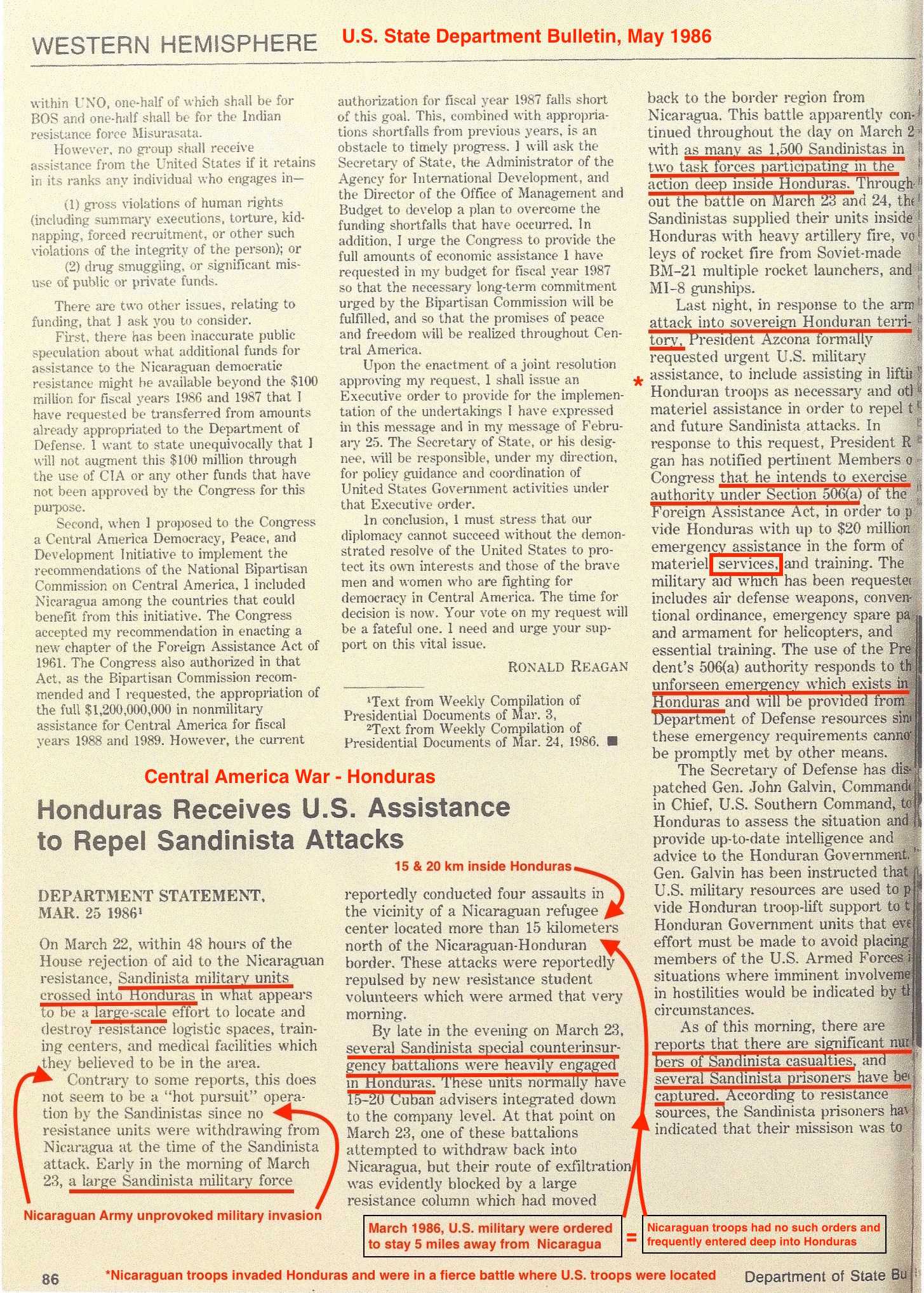
The above award is for this Service Members’ deployment to Honduras during an austere low intensity conflict operation in Honduras! A severe or harsh LIC foreign Contingency Operation!
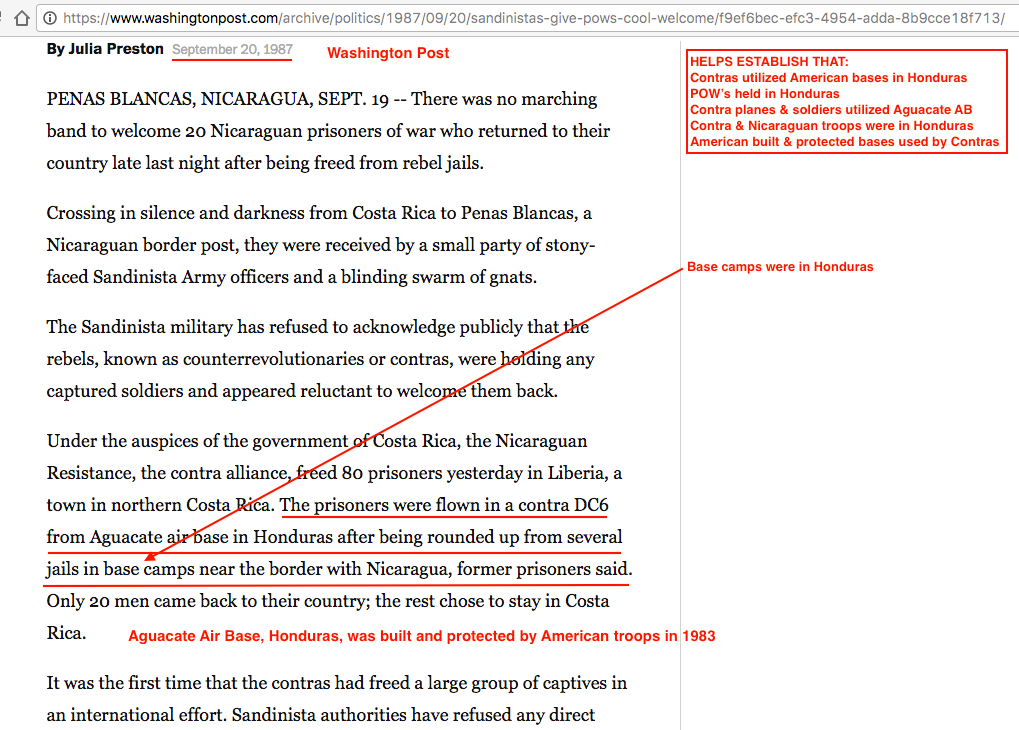
How can you help? Support VFW Res. 419 – Honduras!
Please help us advocate for recognition as Veterans of this Low-Intensity Conflict by sending a letter to your U.S. Congress or Senate representative in support of our mission by asking Congress to issue an Armed Forces Expeditionary Medal to all U.S. troops who served in Honduras from 1981 to 1992. This will help the veterans and families of the killed and wounded, those veterans attempting to receive proper combat honors and recognition for their sacrifices during the decade that ended Soviet communism. Support VFW Res. 419!
WAR? LOW-INTENSITY CONFLICT? IMMINENT DANGER AREA?
TELL YOUR REPRESENTATIVE WHAT YOU THINK!
Please also visit our Facebook page!

